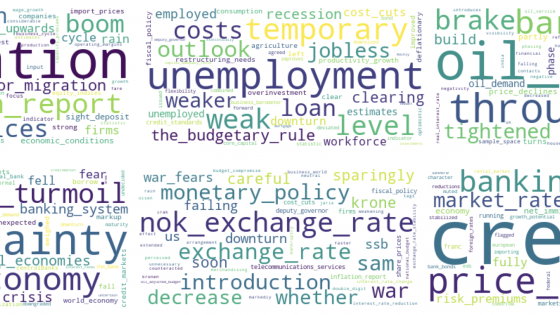In the months and years following the Global Crisis and Great Recession of 2007-09, the ECB engaged in a number of unconventional policy measures meant to forestall a further drop in economic activity and, ultimately, to ignite economic growth (Zabczyk and Farmer 2016). One of those measures, forward guidance, was intended to stimulate current consumption by informing the public that interest rates would be kept inordinately low for an extended period and hence to increase their inflation expectations.
The premise behind this policy was that consumers were fully cognisant of monetary policy and would believe that keeping interest rates low even after the recession would spark inflation in the future. This reasoning implied that they would be encouraged to spend their money in the near term before inflation kicked in (D’Acunto et al. 2022d). Likewise, consumers would wait to save in the future when interest rates were higher. This premise was flawed, according to our forthcoming paper, “IQ, Expectations, and Choice” (D’Acunto et al. 2022a).
Based on Finnish data that measures, in part, consumers’ awareness and understanding of the economy and economic policy, we find that only consumers in the top part of the distribution of cognitive abilities are aware of policy and its impact and, therefore, alter their behaviour. This finding not only suggests that policies like forward guidance have little chance to succeed, but also that these policies may be inherently discriminatory because they favour those consumers with the wherewithal to react accordingly.
Fundamental to modern dynamic models in macroeconomics and finance is the idea of intertemporal substitution, which means in this case that people make consumption and savings choices based on the level of interest rates. As described above, if real interest rates are low, then all individuals in these models are inclined to spend their money; however, as interest rates increase, everyone is more inclined to save. These are known as representative agent models, and to the degree that they are true, they provide a powerful tool for policymakers, who can simply turn the knobs of interest rates and generate a desired amount of economic activity.
It turns out, though, that these assumptions about behaviour are mostly not true. While there are some people who pay attention to policy and optimise their choices based on those measures, most people are either oblivious to policy or otherwise disinclined to pay heed. If a household wants a new refrigerator, say, or a new car or a computer, it is likely to consider its level of disposable income and not the path of future interest rates. Indeed, most people likely have little idea what rates are, either in the near or far term.
Anecdotally, and perhaps based on our own experience, it makes sense to question the assumptions of representative agent models. The contribution from our paper, though, is that it tests this intuition against data that reveal what people know about policy and how they react to it. These data come from Finland, where all men around age 20 are required to take a standardised cognitive (IQ) test at the beginning of military service, and from a monthly consumer confidence survey conducted by Statistics Finland on behalf of the European Commission. These monthly surveys ask about general and personal economic conditions, as well as households’ plans to spend, save, and borrow.
Given both the homogeneous nature of Finland over the sample period and the fact that all Finns receive a nearly free education through college, the country provides a good laboratory to disentangle the effects of cognitive abilities from important confounders like education levels and labour income. And the consumer confidence survey asks questions pertinent to policymaking, for example:
- “In view of the general economic situation in Finland, do you think that now it is the right moment for people to make major purchases such as furniture, electrical/electronic devices, etc.?”; and
- “How will consumer prices evolve during the next twelve months compared to the previous twelve months?”
From these and other questions—including those that ask for point estimates of past and future inflation—and from consideration of such demographics as age, education levels, marital status, income, household size, and employment status, we conclude the following: Only men with high IQs adjust the amount they consume in response to changes in inflation expectations, and high-IQ men are also twice as sensitive to changes in interest rates when borrowing relative to other men.
Low-IQ men make up more than half of the men and half of the income in our sample, which suggests that their non-response to policy changes can be a primary factor in explaining the limited effectiveness of unconventional monetary policy like forward guidance. We then extend this analysis to more traditional monetary policy in D’Acunto et al. (2022b). In this study, we find that only high-IQ men react in accordance with policy’s intent, as their propensity to borrow increases when rates fall and decreases when rates rise. For low-IQ men, there is no correlation between borrowing behaviour and interest rate changes.
During and after the Global Crisis, policymakers devised measures to affect household behaviour by attempting to manage households’ beliefs about future macroeconomic conditions, with the goal of encouraging consumption over savings. However, due to households’ seeming inattention to, and understanding of, economic policy, those measures were not as effective as planned.
This is not good news for monetary policymakers. Short-term interest rates are the conventional monetary-policy tool of central banks, and consumer credit is a primary means of affecting changes to the real economy. However, if consumers do not play along, then such policies are necessarily suboptimal. This provides a challenge for both policymakers and researchers. For example, policymakers could design policies that are easier to understand for the whole population (Andre et al., 2022).
Novel communication strategies might also be necessary to inform most of the population (Coibion et al. 2022, Blinder et al. 2022). The financial services industry is well-served by traditional media and by their own news-gathering efforts, but most people do not closely track business and financial news or, it seems, understand its consequences (D’Acunto at al. 2022c).
Until such changes are made and proven effective, policymakers must seriously consider the potential discriminatory effects of monetary policy. While these effects are unintended, they are no less real, and further research is needed to help design policies that not only mitigate these effects but also, broadly speaking, deliver more effective results.
References
Andre, P, C Pizzinelli, C Roth and J Wohlfart (2022), “Subjective Models of the Macroeconomy: Evidence From Experts and Representative Samples”, Review of Economic Studies 89(6): 2958–2991.
Blinder, A, M Ehrmann, J De Haan and D J Jansen (2022), “Central bank communication with the general public: Promise or false hope?”, Journal of Economic Literature (forthcoming).
Coibion, O, Y Gorodnichenko and M Weber (2022), “Monetary Policy Communications and Their Effects on Household Inflation Expectations”, Journal of Political Economy 130(6): 1537–1584.
D’Acunto, F, D Hoang, M Paloviita and M Weber (2019), “Cognitive abilities and inflation expectations”, AEA Papers and Proceedings 109: 562–566.
D’Acunto, F, D Hoang, M Paloviita and M Weber (2022a), “IQ, Expectations and Choice”, Review of Economic Studies, forthcoming.
D’Acunto, F, D Hoang, M Paloviita and M Weber (2022b), “Human Frictions in the Transmission of Economic Policies”, Working paper.
D’Acunto, F, D Hoang, M Paloviita and M Weber (2022c), “Effective Policy Communication: Targets versus Instruments”, Working paper.
D’Acunto, F, D Hoang and M Weber (2022d), “Managing Household Expectations with Unconventional Policies”, Review of Financial Studies 35(4): 1597–1642.
Harrison, R, M Waldron and A Haberis (2017), “The forward guidance paradox”, VoxEU.org, 21 September.
Strasser, G, G Gaballo, P Hoffmann and M Ehrmann (2019), “Signalling a future path of interest rates: The international evidence on forward guidance”, VoxEU.org, 1 August.
Zabczyk, P and R Farmer (2016), “Why unconventional monetary policy works in theory”, VoxEU.org, 26 October.







